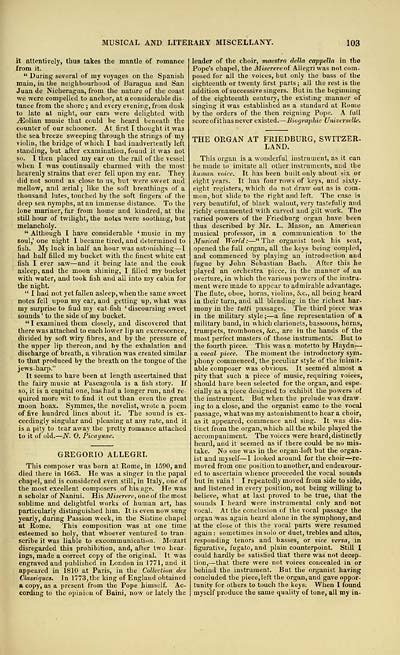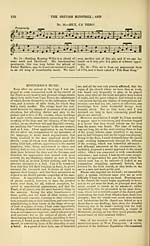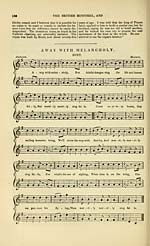Glen Collection of printed music > Printed music > British minstrel, and musical and literary miscellany
(441) Page 103
Download files
Complete book:
Individual page:
Thumbnail gallery: Grid view | List view

MUSICAL AND LITERARY MISCELLANY.
103
it attentively, tbus takes the mantle of romance
from it.
" During several of my voyages on the Spanish
main, in the neighbourhood of Baragua and San
Juan de Nicheragua, from the nature of the coast
we were compelled to anchor, at a considerable dis-
tance from the shore ; and every evening, from dusk
to late at night, our ears were delighted with
jEolian music that could be heard beneath the
counter of our schooner. At first I thought it was
tlie sea breeze sweeping through the strings of my
violin, the bridge of which I had inadvertently left
standing, but after examination, found it was not
so. I then placed my ear on the rail of the vessel
when I was continually charmed with the most
heavenly strains that ever fell upon my ear. They
did not sound as close to us, but were sweet and
mellow, and aerial ; like the soft breathings of a
tliousand lutes, touched by the soft fingers of the
deep sea nymphs, at an immense distance. To the
lone mariner, far from home and kindred, at the
still hour of twilight, the notes were soothing, but
melancholy.
" Although I have considerable ' music in my
Boul,' one night I became tired, and determined to
fish. My luck in half an hour was astonishing — I
had half filled my bucket with the finest white cat
fish I ever saw — and it being late and the cook
asleep, and the moon shining, I filled my bucket
with water, and took fish and all into my cabin for
the night.
" I had not yet fallen asleep, when the same sweet
notes fell upon my ear, and getting up, what was
my surprise to find my catfish ' discoursing sweet
sounds ' to the side of my bucket.
" I examined them closely, and discovered that
there was attached to each lower lip an excrescence,
divided by soft wiry fibres, and by the pressure of
the upper lip thereon, and by the exhalation and
discharge of breath, a vibration was created similar
to that produced by the breath on the tongue of tlie
jews-harp."
It seems to have been at length ascertained that
the faii7 music at Pascagoula is a fish story. If
so, it is a capital one, has had a longer run, and re-
quired more wit to find it out than even the great
moon hoax. Symmes, the novelist, wrote a poem
of five hundred lines about it. The sound is ex-
ceedingly singular and pleasing at any rate, and it
is a pity to tear away the pretty romance attached
to it of old. — N. 0. Picayune.
leader of the choir, maestro dclla cappella in the
Pope's chapel, the Miserere of Allegriwas not com-
posed for all the voices, but only the bass of the
eighteenth or twenty-first parts ; all the rest is the
addition of successive singers. But in the beginning
of the eighteenth century, the existing manner of
singing it was established as a standard at Rome
by the orders of the then reigning Pope. A full
score ofit has never existed. — Biographie Univfrselle,
GREGORIO ALLEGRL
This composer was born at Rome, in 1590, and
died there in 1C63. He was a singer in the papal
chapel, and is considered even still, in Italy, one of
the most excellent composers of his age. He was
a scholar of Naniui. His Miserere, one of the most
sublime and delightful works of human art, has
particularly distinguished him. It is even now sung
yearly, during Passion week, in the Sistine chapel
at Rome. This composition was at one time
esteemed so holy, that whoever ventured to tran-
scribe it was liable to excommunication. Mozart
disregarded this prohibition, and, after two hear-
ings, made a correct copy of the original. It was
engraved and published in London in 1771, and it
appeared in 1810 at Paris, in the Collection des
Classiques. In 1773, the king of England obtained
a copy, as a present from the Pope himself. Ac-
cording to the opinion of Baini, now or lately the
THE ORGAN AT FRIEDBURG, SWITZER-
LAND.
This organ is a wonderful instrument, as it can
be made to imitate all other instruments, and the
human voice. It has been built only about six or
eight years. It has four rows of keys, and sixty-
eight registers, which do not draw out as is com-
mon, but shde to the right and left. The case is
very beautiful, of black walnut, very tastefully and
richly ornamented with carved and gilt work. The
varied powers of the Friedburg organ have been
thus described by Mr. L. Mason, an American
musical professor, in a communication to the
Musical World: — "The organist took his seat,
opened the full organ, all the keys being coupled,
and commenced by playing an introduction and
fugue by John Sebastian Bach. After this he
played an orchestra piece, in the manner of an
overture, in which the various powers of the instru-
ment were made to appear to admirable advantage.
The flute, oboe, horns, violins, &c., all being heard
in their turn, and all blending in the richest har-
mony in the tutti passages. The third piece was
in the military style ; — a fine representation of a
military band, in which clarionets, bassoons, horns,
trumpets, trombones, &c., are in the hands of the
most perfect masters of those instruments. But to
the fourth piece. This was a motetto by Haydn—
a vocal piece. The moment the introductory syni-
phony commenced, the peculiar style of the inimit-
able composer was obvious. It seemed almost a
pity that such a piece of music, requiring voices,
should have been selected for the organ, and espe-
cially as a piece designed to exhibit the powers of
the instrument. But when the prelude was draw-
ing to a close, and the organist came to the vocal
passage, what was my astonishment to hear a choir,
as it appeared, commence and sing. It was dis-
tinct from the organ, which all the while played the
accompaniment. The voices were heard, distinctly
heard, and it seemed as if there could be no mis-
take. No one was in the organ-loft but the organ-
ist and myself — I looked around for the choir — re-
moved from one position to another, and endeavour-
ed to ascertain whence proceeded the vocal sounds
but in vain ! I repeatedly moved from side to side,
and listened in every position, not being willing to
believe, what at last proved to be true, that the
sounds I heard were instrumental only and not
vocal. At the conclusion of the vocal passage the
organ was again heard alone in the symphony, and
at the close ot this the vocal parts were resumed
again : sometimes in solo or duet, trebles and altos,
responding tenors and basses, or vice versa, in
figurative, fugato, and plain counterpoint. Still I
could hardly be satisfied that there was not decep-
tion, — that there were not voices concealed in or
behind the instrument. But the organist having
concluded the piece, left the organ, and gave oppor-
tunity for others to touch the keys; When I found
myself produce the same quality of tone, all my in-
103
it attentively, tbus takes the mantle of romance
from it.
" During several of my voyages on the Spanish
main, in the neighbourhood of Baragua and San
Juan de Nicheragua, from the nature of the coast
we were compelled to anchor, at a considerable dis-
tance from the shore ; and every evening, from dusk
to late at night, our ears were delighted with
jEolian music that could be heard beneath the
counter of our schooner. At first I thought it was
tlie sea breeze sweeping through the strings of my
violin, the bridge of which I had inadvertently left
standing, but after examination, found it was not
so. I then placed my ear on the rail of the vessel
when I was continually charmed with the most
heavenly strains that ever fell upon my ear. They
did not sound as close to us, but were sweet and
mellow, and aerial ; like the soft breathings of a
tliousand lutes, touched by the soft fingers of the
deep sea nymphs, at an immense distance. To the
lone mariner, far from home and kindred, at the
still hour of twilight, the notes were soothing, but
melancholy.
" Although I have considerable ' music in my
Boul,' one night I became tired, and determined to
fish. My luck in half an hour was astonishing — I
had half filled my bucket with the finest white cat
fish I ever saw — and it being late and the cook
asleep, and the moon shining, I filled my bucket
with water, and took fish and all into my cabin for
the night.
" I had not yet fallen asleep, when the same sweet
notes fell upon my ear, and getting up, what was
my surprise to find my catfish ' discoursing sweet
sounds ' to the side of my bucket.
" I examined them closely, and discovered that
there was attached to each lower lip an excrescence,
divided by soft wiry fibres, and by the pressure of
the upper lip thereon, and by the exhalation and
discharge of breath, a vibration was created similar
to that produced by the breath on the tongue of tlie
jews-harp."
It seems to have been at length ascertained that
the faii7 music at Pascagoula is a fish story. If
so, it is a capital one, has had a longer run, and re-
quired more wit to find it out than even the great
moon hoax. Symmes, the novelist, wrote a poem
of five hundred lines about it. The sound is ex-
ceedingly singular and pleasing at any rate, and it
is a pity to tear away the pretty romance attached
to it of old. — N. 0. Picayune.
leader of the choir, maestro dclla cappella in the
Pope's chapel, the Miserere of Allegriwas not com-
posed for all the voices, but only the bass of the
eighteenth or twenty-first parts ; all the rest is the
addition of successive singers. But in the beginning
of the eighteenth century, the existing manner of
singing it was established as a standard at Rome
by the orders of the then reigning Pope. A full
score ofit has never existed. — Biographie Univfrselle,
GREGORIO ALLEGRL
This composer was born at Rome, in 1590, and
died there in 1C63. He was a singer in the papal
chapel, and is considered even still, in Italy, one of
the most excellent composers of his age. He was
a scholar of Naniui. His Miserere, one of the most
sublime and delightful works of human art, has
particularly distinguished him. It is even now sung
yearly, during Passion week, in the Sistine chapel
at Rome. This composition was at one time
esteemed so holy, that whoever ventured to tran-
scribe it was liable to excommunication. Mozart
disregarded this prohibition, and, after two hear-
ings, made a correct copy of the original. It was
engraved and published in London in 1771, and it
appeared in 1810 at Paris, in the Collection des
Classiques. In 1773, the king of England obtained
a copy, as a present from the Pope himself. Ac-
cording to the opinion of Baini, now or lately the
THE ORGAN AT FRIEDBURG, SWITZER-
LAND.
This organ is a wonderful instrument, as it can
be made to imitate all other instruments, and the
human voice. It has been built only about six or
eight years. It has four rows of keys, and sixty-
eight registers, which do not draw out as is com-
mon, but shde to the right and left. The case is
very beautiful, of black walnut, very tastefully and
richly ornamented with carved and gilt work. The
varied powers of the Friedburg organ have been
thus described by Mr. L. Mason, an American
musical professor, in a communication to the
Musical World: — "The organist took his seat,
opened the full organ, all the keys being coupled,
and commenced by playing an introduction and
fugue by John Sebastian Bach. After this he
played an orchestra piece, in the manner of an
overture, in which the various powers of the instru-
ment were made to appear to admirable advantage.
The flute, oboe, horns, violins, &c., all being heard
in their turn, and all blending in the richest har-
mony in the tutti passages. The third piece was
in the military style ; — a fine representation of a
military band, in which clarionets, bassoons, horns,
trumpets, trombones, &c., are in the hands of the
most perfect masters of those instruments. But to
the fourth piece. This was a motetto by Haydn—
a vocal piece. The moment the introductory syni-
phony commenced, the peculiar style of the inimit-
able composer was obvious. It seemed almost a
pity that such a piece of music, requiring voices,
should have been selected for the organ, and espe-
cially as a piece designed to exhibit the powers of
the instrument. But when the prelude was draw-
ing to a close, and the organist came to the vocal
passage, what was my astonishment to hear a choir,
as it appeared, commence and sing. It was dis-
tinct from the organ, which all the while played the
accompaniment. The voices were heard, distinctly
heard, and it seemed as if there could be no mis-
take. No one was in the organ-loft but the organ-
ist and myself — I looked around for the choir — re-
moved from one position to another, and endeavour-
ed to ascertain whence proceeded the vocal sounds
but in vain ! I repeatedly moved from side to side,
and listened in every position, not being willing to
believe, what at last proved to be true, that the
sounds I heard were instrumental only and not
vocal. At the conclusion of the vocal passage the
organ was again heard alone in the symphony, and
at the close ot this the vocal parts were resumed
again : sometimes in solo or duet, trebles and altos,
responding tenors and basses, or vice versa, in
figurative, fugato, and plain counterpoint. Still I
could hardly be satisfied that there was not decep-
tion, — that there were not voices concealed in or
behind the instrument. But the organist having
concluded the piece, left the organ, and gave oppor-
tunity for others to touch the keys; When I found
myself produce the same quality of tone, all my in-
Set display mode to: Large image | Transcription
Images and transcriptions on this page, including medium image downloads, may be used under the Creative Commons Attribution 4.0 International Licence unless otherwise stated. ![]()
| Special collections of printed music > Glen Collection of printed music > Printed music > British minstrel, and musical and literary miscellany > (441) Page 103 |
|---|
| Permanent URL | https://digital.nls.uk/91440237 |
|---|
| Description | Scottish songs and music of the 18th and early 19th centuries, including music for the Highland bagpipe. These are selected items from the collection of John Glen (1833 to 1904). Also includes a few manuscripts, some treatises, and other books on the subject. |
|---|
| Description | The Glen Collection and the Inglis Collection represent mainly 18th and 19th century Scottish music, including Scottish songs. The collections of Berlioz and Verdi collected by bibliographer Cecil Hopkinson contain contemporary and later editions of the works of the two composers Berlioz and Verdi. |
|---|

